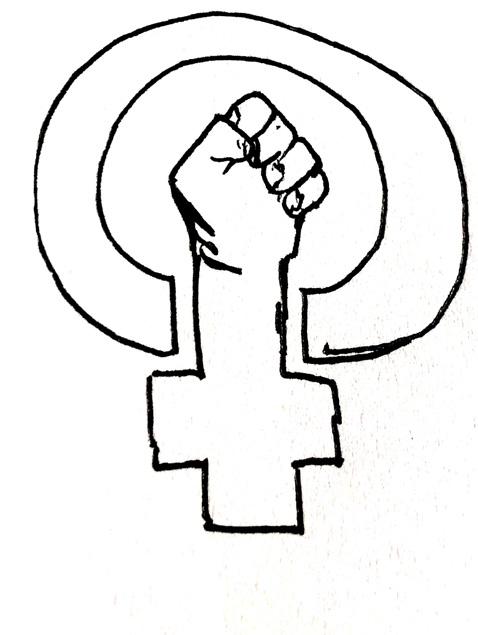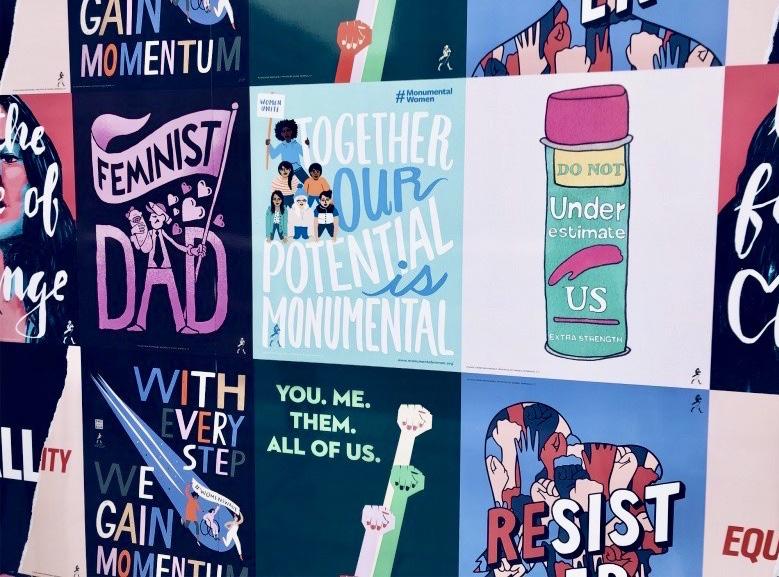
9 minute read
WOMXN OF THE HOUSE; Celebrating the Remarkable Victories of Womxn in Congress in 2020
by HCAmerican
Emma Nicholson
Doodles by Noël Sedona James
Advertisement
At the start of 2020, 101 congresswomxn served in the House of Representatives. Though a seemingly large number, there are 435 total representatives serving. This means that at the beginning of 2020, only 23 percent of the House was made up of womxn. And unfortunately the Senate was not much different, with only 26 out of 100 senators being womxn.
For hundreds of years, womxn have fought for their place in bodies of government, and yet here we are, in 2020, still immensely underrepresented. But despite the current representation of womxn in congress seeming low, it is actually more than has ever been seen before.
In 1917, Jeannette Rankin of Montana was elected as the first womxn in the House of Representatives. A suffragette and activist for womxn in government, Rankin advocated for the creation of the Committee on Womxn Suffrage and was later appointed to the said committee. It is almost unimaginable to think of how Rankin felt during her time in the House, surrounded by men, all the while advocating for the rights of womxn. Yet she persisted, as many womxn do, speaking eloquently and convincingly among these men. Rankin began a movement unlike any other to show that womxn belong in governing bodies; the reverberations of her work are still apparent in congress today, with the representation having increased significantly.
Among the womxn represented in the House today, there are inspirational stories of individuals who, like Rankin, broke down barriers to rightfully earn their seat. These are stories of confidence, perseverance, and persistance, and there are countless stories to tell. But there are three womxn I’d like to highlight, whose impact on congress in 2020 has reached far beyond the journey to their seat. Despite the insanity that has been 2020, these womxn consistently raised the bar for what it means to be a womxn in government, advocating not only for their political beliefs, but for a womxn’s place in the House--the House of Representatives, that is.
Alexandria Ocasio-Cortez: Silence is Not Acceptance
Congresswomxn Alexandria Ocasio-Cortez, or AOC as she is commonly known, represents New York’s 14th district, and has been serving in congress since 2018. Ocasio-Cortez represents the Democratic Party and earned her place in congress after defeating Joe Crowley in one of the biggest congressional upsets in 2018, given Crowley’s incumbent status.
AOC’s biggest moment of 2020 was arguably July 23, when she gave a House floor speech that was heard around the country. This was a speech that poignantly rebutted one man’s hateful dialogue while also reminding Congress (and the country) that verbal abuse towards womxn occurs beyond governing bodies.
After being verbally attacked by Rep. Ted Yoho of Florida on the steps of the Capitol building earlier in the year, AOC used her time on the floor to speak to the issue, after Mr. Yoho issued a series of unacceptable excuses for his behavior.
What is so admirable about AOC, apart from her eloquent words, is the way that she expressed this righteous anger all while sending a message about abuse, sexism, and standing up for what is right, to womxn all over the country. In her remarks, AOC added that she originally had not planned on further discussing this issue, until Mr. Yoho’s excuses began.
Amidst her poignant remarks, this moment of her speech in particular resonated with young womxn across the country: “I could not allow my nieces, I could not allow the little girls that I go home to, I could not allow victims of verbal abuse and worse to see that, to see that excuse and to see our Congress accept it as legitimate and accept it as an apology and to accept silence as a form of acceptance...” A main takeaway: Silence is not a form of acceptance. AOC reminds womxn and individuals across the country that we cannot remain silent about important issues like verbal abuse.


Alexandria Ocasio-Cortez
Rep. Ocasio-Cortez continued with what became arguably the most memorable moment of her speech: “... I will not stay up late at night waiting for an apology from a man who has no remorse over calling womxn and using abusive language towards womxn, but what I do have issues with is using womxn, our wives and daughters, as shields and excuses for poor behavior.”
AOC closed out her speech with a powerful reminder that this is not new behavior, and it is reflected in many environments beyond the House of Representatives. “It happens every day in this country,” she remarked. And many found truth in this statement, sharing their own stories of abuse to stand in solidarity with AOC.
This congressional speech was shared by thousands around the country, especially many womxn who felt seen after hearing AOC’s words. It even inspired a viral TikTok trend, where young people lip-synced to Rep. Ocasio-Cortez’s words.
Amidst a year of turmoil, AOC’s eloquence, bravery, and strength in discussing verbal abuse in a room full of predominantly men was nothing short of incredible. Though many knew AOC prior to this speech for her work with Bernie Sanders, this moment of 2020 certainly was unforgettable, and gave many young womxn an inspiring role-model to look up to--both politically and in strength of character.

Katie Porter
Katie Porter, Consumer Law, and A Whiteboard
One of the most notable congressional stories of this year is the story of Katie Porter and her whiteboard. In October, Representative Katie Porter, a Democrat representing California’s 45th district, made the headlines after using a whiteboard in a questioning on the House floor. Her “whiteboard of justice” as dubbed by Elle Magazine, served its purpose this October as Porter questioned BigPharma CEO Mark Alles, citing the numbers on her whiteboard to aid in her powerful (and factual testimonial). Rep. Porter made her mark both with her expo marker, and by leaving others in congress (and around the country) inspired by her intelligence.
In addition to serving her first term in the House, Representative Porter is also a professor of consumer law at UC Irvine, a mom to three kids, and “Cubmaster,” (also known as a leader of her son’s Cub Scout Pack). As a consumer advocate, her areas of expertise include protecting consumers against financial institutions, banks, and federal credit protection, among other economic specialities. She was appointed in 2012 by Vice-President Elect Kamala Harris, who was then the Attorney General of California, to develop a team and keep watch over financial institutions in California. Currently representing Orange County, Porter continues her fight for consumers in the political sphere while also focusing on the specific needs of families in her county.
Since beginning her term in Congress, Rep. Porter has certainly made a name for herself in her pursuit of advocacy and factual information. Her whiteboard is a symbol of the power she, and other womxn in Congress hold. Katie Porter demanded the attention of the floor of Congress that day in October, reminding the group that numbers do not lie. Math does not lie. And womxn can, just as easily as men, utilize numbers to prove them wrong. Sometimes, it just takes spelling it out on a whiteboard for others to understand.

Maxine Waters
Maxine Waters: “Reclaiming My Time”
As most womxn will attest to, dealing with “mansplaining” and other purposeful interruptions by men is immensely frustrating. But Maxine Waters, a Democratic Representative from California, made the news when she rightfully took back her time on the floor of the House, with a simple three-word phrase.
During a testimony in 2017 by Secretary of the Treasury Steve Munchin, Waters was rudely interrupted by Munchin as he openly avoided a question asked by Waters. Her response? “Reclaiming my time,” she said, proudly. And she did just that-- Waters was then granted the floor by the chair of the hearing. However, Rep. Waters had to use that same phrase multiple times during the hearing to reclaim her time that was being taken by Munchin’s constant interruptions.
This phrase became iconic, symbolizing not only Rep. Waters’ actions that day, but symbolizing the shared anger of womxn all over the world who have been interrupted by men. Especially in a governing body like congress, members should treat each other with the utmost respect-respect that Waters was not receiving. So, as any strong womxn would, she recognized she was being wronged and asserted herself to get her time.
This October, “Reclaiming My Time: The Power of Maxine Waters,” by Helena Andrews-Dyer, and R. Eric Thomas, was published. The book tells the story of Waters’ life and work, beginning during her childhood growing up in St. Louis, Missouri.
“Let me just say this,” Waters says in the book. “I’m a strong black woman, and I cannot be intimidated. I cannot be undermined…” Waters continues to be a role model for womxn all over the country, especially for BIPOC womxn. She represents what it means to be a strong womxn in politics, one who faces challenges head on and rightfully claims the time she knows she deserves to express views of utmost importance.

2020: A Record Breaking Year for Womxn
These stories told today are not the only stories of powerful, female strength in government. They are simply one part of the ever-changing narrative of what it means to be a womxn in government.
In the 2020 election, records were broken, with more womxn than ever before elected to congress: 134 womxn have been elected. We have the first transgender senator, Sarah McBride serving in Delaware. We have Cori Bush, Missouri’s first black Congresswomxn. Yvette Harell, the first Native American womxn to serve in Congress, was elected in New Mexico. In fact, all three representatives in New Mexico are womxn of color. And of course, we have just elected our first womxn to the position of Vice President. VP-elect Kamala Harris will also be the first womxn of color to serve in that position, which is truly historic. These are just a few of the incredible achievements made this year.
Do not get me wrong; we still have a long way to go in order to increase the representation of womxn in government. Womxn should be equally represented, just as men are, because at the end of the day, we are just as capable. But so far, we have made a great start.
2020 was a year of challenges for us all, but these womxn of the House of Representatives proved that not even a global pandemic can stop them from demonstrating what it means to be a strong, powerful womxn.


Jordyn Habib

Jordyn Habib










